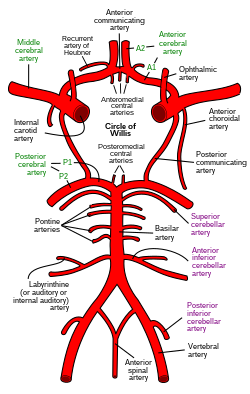Posterior circulation infarct
Editor-In-Chief: Prab R Tumpati, MD
Obesity, Sleep & Internal medicine
Founder, WikiMD Wellnesspedia &
W8MD medical weight loss NYC and sleep center NYC
| Posterior circulation infarct | |
|---|---|

| |
| Synonyms | Vertebrobasilar stroke |
| Pronounce | N/A |
| Specialty | N/A |
| Symptoms | Dizziness, vertigo, diplopia, dysarthria, ataxia, nausea, vomiting, headache, visual disturbances |
| Complications | Cerebellar swelling, brainstem compression, hydrocephalus |
| Onset | Sudden |
| Duration | Variable |
| Types | N/A |
| Causes | Atherosclerosis, embolism, vertebral artery dissection |
| Risks | Hypertension, diabetes mellitus, smoking, hyperlipidemia, atrial fibrillation |
| Diagnosis | MRI, CT scan, angiography |
| Differential diagnosis | Migraine, seizure, multiple sclerosis, labyrinthitis |
| Prevention | N/A |
| Treatment | Thrombolysis, antiplatelet therapy, anticoagulation, rehabilitation |
| Medication | N/A |
| Prognosis | Variable, depends on severity and treatment |
| Frequency | 20% of all ischemic strokes |
| Deaths | Can be fatal if untreated |
Posterior Circulation Infarct (PCI) refers to a type of ischemic stroke that occurs in the posterior circulation of the brain, which supplies blood to the brainstem, cerebellum, and occipital lobes. This condition is significant due to the critical functions of these brain regions, including coordination, balance, vision, and consciousness. Understanding the causes, symptoms, diagnosis, and treatment of PCI is crucial for managing its impacts effectively.
Causes
Posterior Circulation Infarct is primarily caused by the blockage or narrowing of the arteries that supply blood to the posterior part of the brain. The main arteries involved include the vertebral arteries, basilar artery, and posterior cerebral arteries. The blockage may result from various conditions, including:
- Atherosclerosis, where the arteries become clogged with fatty deposits.
- Embolism, where blood clots from other parts of the body travel to the brain.
- Arterial dissection, which is a tear in the artery wall.
- Hypercoagulability, an increased tendency for blood clotting.
Symptoms
The symptoms of a Posterior Circulation Infarct can vary widely depending on the specific brain areas affected but may include:
- Vertigo and dizziness
- Ataxia, or lack of muscle coordination
- Visual disturbances, including blindness in one half of the visual field (hemianopia)
- Weakness or numbness on one side of the body
- Dysphagia, or difficulty swallowing
- Dysarthria, difficulty speaking
- Headache
- Confusion and changes in consciousness
Diagnosis
Diagnosing PCI involves a combination of clinical assessment and imaging studies. Key diagnostic tools include:
- Magnetic Resonance Imaging (MRI), which can provide detailed images of the brain's structure and identify areas of infarction.
- Computed Tomography (CT) scans, which can quickly identify hemorrhages but may not initially show ischemic strokes.
- Magnetic Resonance Angiography (MRA) or CT Angiography (CTA), which are used to visualize the blood vessels and detect blockages or other abnormalities.
Treatment
Treatment for Posterior Circulation Infarct aims to restore blood flow to the affected area of the brain and prevent further strokes. Treatment options include:
- Thrombolysis, the administration of clot-busting drugs, which is most effective if administered within a few hours of stroke onset.
- Anticoagulant therapy, to prevent new clots from forming.
- Antiplatelet therapy, to prevent clotting.
- In some cases, surgical interventions such as angioplasty and stenting may be necessary to open blocked arteries.
- Rehabilitation therapies, including physical therapy, occupational therapy, and speech therapy, are crucial for recovering lost functions.
Prevention
Preventing a Posterior Circulation Infarct involves managing the risk factors for stroke. This includes:
- Controlling hypertension (high blood pressure)
- Managing diabetes
- Reducing cholesterol levels
- Quitting smoking
- Maintaining a healthy weight
- Regular physical activity
See Also
Transform your life with W8MD's budget GLP-1 injections from $125.
W8MD offers a medical weight loss program to lose weight in Philadelphia. Our physician-supervised medical weight loss provides:
- Most insurances accepted or discounted self-pay rates. We will obtain insurance prior authorizations if needed.
- Generic GLP1 weight loss injections from $125 for the starting dose.
- Also offer prescription weight loss medications including Phentermine, Qsymia, Diethylpropion, Contrave etc.
NYC weight loss doctor appointments
Start your NYC weight loss journey today at our NYC medical weight loss and Philadelphia medical weight loss clinics.
- Call 718-946-5500 to lose weight in NYC or for medical weight loss in Philadelphia 215-676-2334.
- Tags:NYC medical weight loss, Philadelphia lose weight Zepbound NYC, Budget GLP1 weight loss injections, Wegovy Philadelphia, Wegovy NYC, Philadelphia medical weight loss, Brookly weight loss and Wegovy NYC
|
WikiMD's Wellness Encyclopedia |
| Let Food Be Thy Medicine Medicine Thy Food - Hippocrates |
Medical Disclaimer: WikiMD is not a substitute for professional medical advice. The information on WikiMD is provided as an information resource only, may be incorrect, outdated or misleading, and is not to be used or relied on for any diagnostic or treatment purposes. Please consult your health care provider before making any healthcare decisions or for guidance about a specific medical condition. WikiMD expressly disclaims responsibility, and shall have no liability, for any damages, loss, injury, or liability whatsoever suffered as a result of your reliance on the information contained in this site. By visiting this site you agree to the foregoing terms and conditions, which may from time to time be changed or supplemented by WikiMD. If you do not agree to the foregoing terms and conditions, you should not enter or use this site. See full disclaimer.
Credits:Most images are courtesy of Wikimedia commons, and templates, categories Wikipedia, licensed under CC BY SA or similar.
Contributors: Prab R. Tumpati, MD

